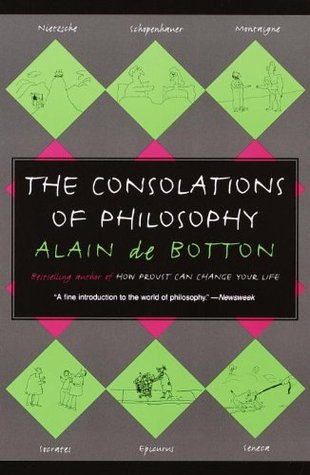More on this book
Community
Kindle Notes & Highlights
A correct statement is one incapable of being rationally contradicted.
knowledge, which involved understanding not only why something was true, but also why its alternatives were false.
What should worry us is not the number of people who oppose us, but how good their reasons are for doing so.
For Epicurus, we are happy if we are not in active pain. Because we suffer active pain if we lack nutrients and clothes, we must have enough money to buy them.
Plain dishes offer the same pleasure as a luxurious table, when the pain that comes from want is taken away.
How badly we react to frustration is critically determined by what we think of as normal.
Seneca more wisely asks us to consider that bad things probably will occur, but adds that they are unlikely ever to be as bad as we fear.
We may be powerless to alter certain events, but we remain free to choose our attitude towards them, and it is in our spontaneous acceptance of necessity that we find our distinctive freedom.
What need is there to weep over parts of life? The whole of it calls for tears.
Those who do not listen to their boredom when reading, like those who pay no attention to pain, may be increasing their suffering unnecessarily.
‘Our greatest pleasure consists in being admired; but the admirers, even if there is every cause, are not very keen to express their admiration. And so the happiest man is he who has managed sincerely to admire himself, no matter how.’
There is only one inborn error, and that is the notion that we exist in order to be happy … So long as we persist in this inborn error … the world seems to us full of contradictions. For at every step, in great things and small, we are bound to experience that the world and life are certainly not arranged for the purpose of maintaining a happy existence … hence the countenances of almost all elderly persons wear the expression of what is called disappointment.
Fulfilment was to be reached not by avoiding pain, but by recognizing its role as a natural, inevitable step on the way to reaching anything good.
they possessed what Nietzsche called ‘life’, which suggested courage, ambition, dignity, strength of character, humour and independence (and a parallel absence of sanctimoniousness, conformity, resentment and prissiness).
Because no one is able to produce a great work of art without experience, nor achieve a worldly position immediately, nor be a great lover at the first attempt; and in the interval between initial failure and subsequent success, in the gap between who we wish one day to be and who we are at present, must come pain, anxiety, envy and humiliation. We suffer because we cannot spontaneously master the ingredients of fulfilment.
The height leaves one out of breath but curiously elated. It is hard not to start grinning, perhaps laughing, for no particular reason, an innocent laughter that comes from the core of one’s being and expresses a primal delight at being alive to see such beauty.
We should not feel embarrassed by our difficulties, only by our failure to grow anything beautiful from them.
European vulgarity, the plebeianism of modern ideas [is the work and invention of] England. Man does not strive for happiness; only the English do that.
Addicted to ‘the religion of comfortableness’, Christians, in their value system, had given precedence to what was easy, not what was desirable, and so had drained life of its potential.


